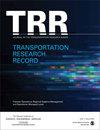数据驱动的佛蒙特州基于里程的用户收费的农村公平和成本问题分析
IF 1.8
4区 工程技术
Q3 ENGINEERING, CIVIL
引用次数: 0
摘要
研究现有州和联邦汽油和柴油消费税的替代品已成为一个紧迫的问题,而高效率和替代燃料汽车的兴起威胁着这些税收的产生能力,这一问题更加严重。文献中经常提出按里程收费作为一种替代办法,这种办法将比城市和高收入人口给农村和低收入人口带来更大的好处。然而,大多数先前的分析依赖于小数据集和汇总数据。本研究利用30多万辆注册乘用车的里程和燃油经济性数据,考察了用收入中性、基于里程的用户收费取代佛蒙特州燃油税的影响。我们发现,平均而言,佛蒙特州家庭每年要多支付23美元,农村家庭和低收入家庭面临的税收负担比城市和高收入家庭要小。由于国家利益,还审查了180美元统一费取代佛蒙特州汽车燃油税的影响。调查结果表明,统一收费将导致更大的价格波动,大多数家庭每年要额外支付47美元。本文提出的分类数据方法直接解决了公众对不公平成本差异的误解,并为公共教育活动提供了背景,以获得基于里程的用户收费政策支持。根据我们的研究结果,有进一步研究基于里程的用户收费的实施的政治基础,包括行政过渡到里程收费的后勤以及相关的计划实施和技术成本。本文章由计算机程序翻译,如有差异,请以英文原文为准。
Data-Driven Analysis of Rural Equity and Cost Concerns for Mileage-Based User Fees in Vermont
Examining substitutes to the current state and federal gasoline and diesel fuel excise taxes has become a pressing issue, exacerbated by the rise of high-efficiency and alternative-fuel vehicles threatening the revenue-generating capacity of these taxes. A mileage-based user fee has been frequently proposed in the literature as an alternative that would offer greater benefits to rural and low-income populations than to urban and higher-income populations. However, most prior analyses relied on small data sets and aggregated data. This study examined the impact of replacing the Vermont state fuels tax with a revenue-neutral, mileage-based user fee using mileage and fuel economy data for over 300,000 registered passenger vehicles. We found that, on average, Vermont households would pay an additional $23 per year, with rural households and low-income households facing smaller tax burdens than their urban and high-income counterparts. The impact of a $180 flat fee replacing the Vermont state motor fuels tax was also examined owing to state interest. Findings indicated that a flat fee would result in much larger price fluctuations, with most households paying an additional $47 per year. The disaggregated data approach presented here directly addresses public misconceptions of inequitable cost differences and provides context for public education campaigns to garner mileage-based user fee policy support. Based on our results, there is political ground for further research into the implementation of a mileage-based user fee, including the logistics of an administrative transition to mileage charging and the associated program implementation and technological costs.
求助全文
通过发布文献求助,成功后即可免费获取论文全文。
去求助
来源期刊

Transportation Research Record
工程技术-工程:土木
CiteScore
3.20
自引率
11.80%
发文量
918
审稿时长
4.2 months
期刊介绍:
Transportation Research Record: Journal of the Transportation Research Board is one of the most cited and prolific transportation journals in the world, offering unparalleled depth and breadth in the coverage of transportation-related topics. The TRR publishes approximately 70 issues annually of outstanding, peer-reviewed papers presenting research findings in policy, planning, administration, economics and financing, operations, construction, design, maintenance, safety, and more, for all modes of transportation. This site provides electronic access to a full compilation of papers since the 1996 series.
 求助内容:
求助内容: 应助结果提醒方式:
应助结果提醒方式:


